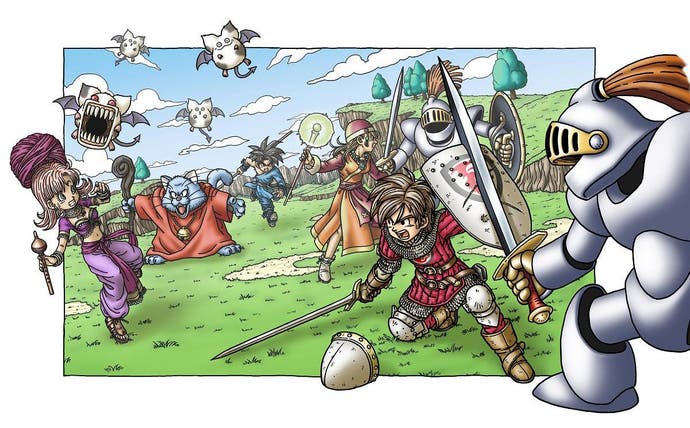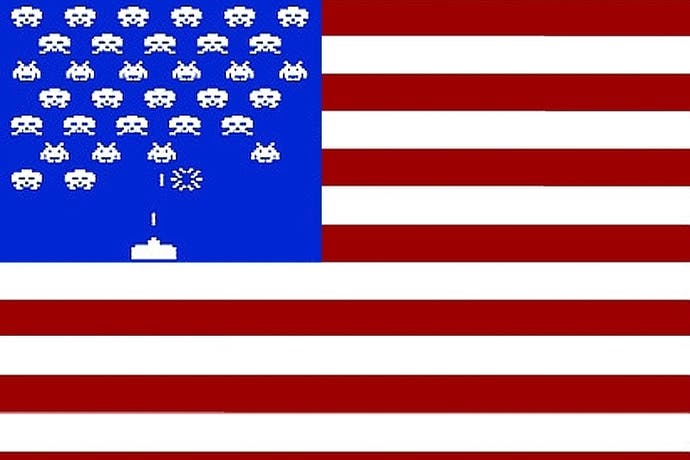Letter from America
Jaz Rignall's weekly US communique arrives via tramp steamer just in time for tea.
Before I kick off proper, one thing I'd like to stress is that I really enjoy conversing with readers, or “users” as you're now known in these fancy future internet times. It's something I've done for years - as anyone who read my old magazines will attest to - and the wonders of the internet now enables it on a level I'd previously never have dreamed of. So, to get to the point, I read the comments posted here, and am genuinely interested in hearing what you have to say, be it feedback, observations, questions of whatever. Point is - let's talk! Whether it's helping you understand the mysteries of the American market, or just talking about games of yore, I'd love to make this weekly article a bit more of an interactive thing where we can chat and share ideas, and a little less of one-way dialog/promo tool for USgamer.
Any-hoo. Onto this week's exciting installment of “what's happening in the good ol' You Ess of Ay”. Or not. Actually, before I get to that - earlier this week I realized that exactly 30 years ago I was unwrapping Manic Miner on my ZX Spectrum for the first time, and finessing my wobbly tape deck's head azimuth alignment with a screwdriver so the game would hopefully load.
The point of me mentioning Manic Miner is because I can say it here, and people know exactly what I'm talking about. Mention it to 99.9% of Americans, and they draw a blank. This is because while us Brits were enjoying the delights of Manic Miner and other such games of the emergent British 8-bit micro computer market of the mid-early-to-mid 80s, Americans were watching their games industry collapse in on itself under the weight of its own effluence. Yeah, 30 years ago, the great US Gaming Crash of '83 was well underway, caused by an over-saturated market that had no less than 12 (count 'em) different consoles available at the time, and was being hideously over-supplied by shovelware stinkers like ET: The Extra Terrestrial, and millions of copies of the crappiest version of Pac-Man known to mankind.

Meanwhile, in the UK (imagine Vivaldi's “Spring” playing while I write this) young lads were buying ZX Spectrums and Commodore 64s, playing football using jumpers for goal posts, and wondering what that lovely fellow Jim would fix this week. These fine chaps and one or two chap-esses bought games for their machines in droves, helping the British games industry (I'm now expertly mixing in the Dambusters theme tune) build momentum through the mid-80s, giving rise to one of the most prolific and interesting periods in games development. While in America, the games industry was pretty much a smoking crater until Nintendo waltzed in and rescued it. And when I say rescued it, I mean something more akin to ruled it with an iron fist as uncontested supreme overlord until Sega managed to do something about it in the early 90s.
History lesson over, and time to move on to history in the making. Big news of the week was Xbox One and PS4's official launch games lists. Each of the USG team members picked their favorite game from each respective roster, and explained why they were excited about it. I was a little worried that my somewhat-jaded-old-geezer take on things would result in me getting some stick, but I needn't have worried. Jeremy Parish's reaction made me look positively positive, thanks to him doing the gaming equivalent of shaking his fist and yelling, “Get orf my lawn”.
We did our first-ever live Q&A session, or rather, AMA as all the cool kids now call live online interviews, and put Fullbright's Steve Gaynor in the hot seat. He's the creator of Gone Home, if you're not familiar with his name, and he gave some really fascinating answers to some really great questions from our community.
And speaking of our community - the biggest response we had this week was the reaction to Jeremy Parish's feature that asked the question, “What's Nintendo's next move?” With Wii U on the ropes mere months after its debut and no relief in sight, he pondered Nintendo's immediate future.
Pete Davison's piece on the indie-blockbuster divide also elicited some good responses. He was inspired by a commenter who said, "I don't like indie games, so Sony's Gamescom conference didn't really do much for me," and ended up talking about the perceptions of mainstream and indie gaming, and how they are changing.

One of my favorite pieces of the week was an examination of the Dragon Quest series. No less than four Dragon Quest games have launched in Japan over the last two years, and a fifth is on the way. Yet there's no sign or hint of any kind of localization of this immensely popular series for the West. So that begs some questions that the article attempted to answer.
Another question you might have asked yourself occasionally is, do video games really rot your brain? Which, coincidentally, is the name of a feature that we posted this week. I imagine many of you are old and wise enough to already know the answer to that question, but just in case you don't, read this.
And finally, you've probably already seen it, but we posted a video of a Gamescom panel where Shuhei Yoshida, president of Worldwide Studios for Sony Computer Entertainment, seems to be dozing off while Quantic Dream's David Cage and others blather on about the possibilities of interactive storytelling. Which is totally understandable.
However, according to a Japanese business etiquette manual, "when Japanese [people] close their eyes in meetings, most of the time, they are not asleep… Often, closed eyes mean they are listening intently, concentrating on what's being said."
That sounds like a fabulous excuse to me, and I've already socked it away so I can trot it out whenever a boring press conference sends me off to the land of the nod.
And on that note - good night/morning/afternoon or whatever time it is.
Jaz Rignall is editorial director of USgamer.net, Eurogamer's star-spangled American cousin. He lives in San Francisco, which, just so you know, has the lowest average temperature of any American city during the summer months.

